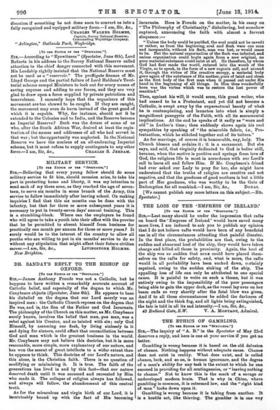DR. SAND AY'S REPLY TO THE BISHOP OF OXFORD.
[To 777 EMIT/107 ran ..97ECTATOE..] Sin—James Anthony Froude was not a Catholic, but he happens to have written a remarkably accurate account of Catholic belief, and especially of the dogma to which Mr. Conybeare objects (Spectator, June 6th). He appears to base his disbelief on the dogma that our Lord merely was an inspired man : the Catholic Church reposes on the dogma that He was, and is, the Son of the Father and God Incarnate. The philosophy of the Church on this matter, as Mr. Conybeare surely knows, involves the belief that man, qua man, was a rebel against his Creator, and so tainted with sin; only God Himself, by assuming our flesh, by living sinlessly in it and dying for sinners, could effect that reconciliation between God and man which is the greatest business in the world. Mr. Conybeare may not believe this doctrine, but it is more reasonable, more simple, more explanatory of our nature, and has won the assent of great intellects to a wider extent than he appears to think. This doctrine of our Lord's nature, and this alone, is the Christian faith. There is no question of modifying or minimizing it. It is true. The faith of the generations has lived in and by this fact—that our nature deserved death until it was assumed and recreated by Him who made it. The collapse of religion always has followed, and always will follow, the abandonment of this central truth.
As for the miraculous and virgin birth of our Lord, it is inextricably bound up with the fact of His becoming incarnate. Here is Froude on the matter, in his essay on "The Philosophy of Christianity," disbelieving, but somehow captured, announcing the faith with almost a fervent eloquence :— " Unless the body could be purified, the soul could not be savedi
or rather, as from the beginning, soul and flesh were one man and inseparable, without his flesh, man was lost, or would cease to be. But the natural organization of the flesh was infected, and unless organization could begin again from a new original, no pure material substance could exist at all. Re therefore, by whom God had first made the world, entered into the womb of the Virgin, so to speak, in the form of a new organic cell, and around it, through the virtue of His creative energy, a material body grew again of the substance of His mother, pure of taint and clean as the first body of the first man when it passed out under His hand in the beginning of all things. In Him thus wonderfully' born was the virtue which was to restore the lost power of mankind."
Then, against his will, it would seem, this great writer, who had ceased to be a Protestant, and yet did not become a Catholic, is swept away by the supernatural beauty of what he is contemplating, and launches into what is simply a magnificent panegyric of the Faith, with all its sacramental implications. At the end he speaks of it sadly as "worn and old" in Luther's time; then suddenly shows again his real sympathies by speaking of "the miserable fabric, i.e., Pro. testantism, which he stitched together out of its tatters."
As for marriage, of course it is honourable, nay, holy. The Church blesses and ordains it it is a sacrament. But she says, and said, that virginity dedicated to God is holier still, because, when the motive is positive and springs from love of God, the religious life is most in accordance with our Lord's call to leave all and follow Him. If Mr. Conybeare's friend had over asked our Lady to pray for her, she might hare understood that the truths of religion are creative and not negative, and that the goodness of good mothers is but a little part of Her goodness, who was worthy to be the Gate of
Redemption for all mankind.—I am, Sir, &c., DOUAI.
[We cannot publish any more letters on this subject.—En. Spectator.]










































 Previous page
Previous page